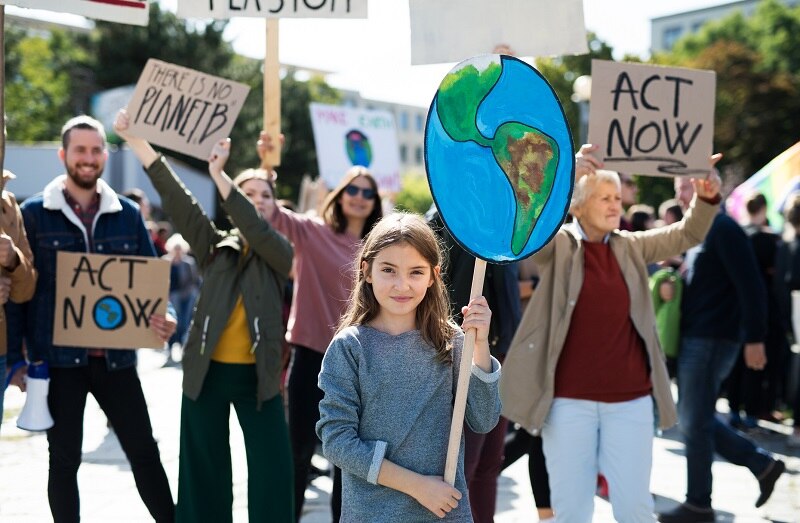The environmental disasters that took place over the past few years have made it extremely difficult to ignore the impacts of climate change. From wildfires in the west to increasingly frequent and destructive hurricanes, climate change is no longer a distant, abstract threat, but something affecting our lives in very real ways right now.
Last year, 2019, may have marked a watershed moment in widespread anxiety about the climate, as millions around the world were moved by the cutting words of 16-year-old Swedish activist Greta Thunberg, Time magazine’s Person of the Year. More than 100,000 people worldwide have downloaded an academic paper called “Deep Adaptation: Navigating Climate Tragedy,” which predicted coming societal collapse as a result of climate change. Most published academic papers get just a few readers. This one touched a nerve.
In response to these new realities, those of us dealing with what is known as eco-anxiety or climate anxiety have also risen in number. Psychologists report sharp increases in people seeking help managing their depression and sadness about the climate crisis following increasingly dire reports about our ecological future.
What is eco-anxiety?
Eco-anxiety is ongoing worry or fear of impending environmental catastrophe, leading to a sense of hopelessness, helplessness and loss.
For some of us, it’s a vague concern we return to over and over again, and for others, according to one leading psychology and climate researcher, it may manifest as “unrelenting day-by-day despair.”
Like other forms of anxiety, eco-anxiety may cause depression, insomnia and irritability. However, unlike some types of anxiety, where our fears aren’t proportionate to the threat, the fear we feel about the future of the climate has justification.
It’s important to note that eco-anxiety is not a mental illness in the way that anxiety disorders are. The eco-psychologists who study the impacts of climate change on mental health advise that eco-anxiety is a logical reaction to very real dangers. Therapists who work with the eco-anxious seek to help them function despite their anxiety and not let it control their lives.
How to manage eco-anxiety
While eco-anxiety is a perfectly reasonable response to what researchers increasingly frame as ecological crisis or collapse, psychologists have tools to help us manage these feelings so we don’t become paralyzed by them. This is vital if we’re going to work together to address environmental threats to our collective future. In fact, research in eco-psychology demonstrates that many of the things we do to protect the planet have beneficial effects on our health.
A 2017 report from the American Psychological Association points out that a number of environmentally positive activities benefit our well-being. Biking or walking not only cuts back on emissions, it also reduces stress. Efforts to increase greenspaces in cities help manage pollution and absorb carbon dioxide, and they also offer us health-promoting places to interact with nature, which has been shown to enhance both physical and mental health. Investments in clean energy prevent carbon and particulate pollution, which has been linked to increased respiratory ailments, depression and reduced cognitive function.
How to take action & empower
Environmental activism is one of the more effective ways to combat the feelings of hopelessness and despair. Shifting personal habits, helping your community and improving society at large to create less dangerous norms not only help the planet, they help you cope, too.
Expressing your sense of urgency in climate strikes and in letters to elected officials can help foster a sense of agency, combating the powerlessness many of us feel.
Consider joining local groups that are working on environmental issues or participating in large-scale protests to reap additional psychological benefit. Connecting with likeminded individuals allows you see that you’re not alone in your worries and provides a safe, supportive outlet for anger and fear.
Here are a five ways to put you and the planet on a path toward better health:
1. Spread the word: Challenge yourself to find meaningful ways to reduce your personal impact, whether it’s driving less, investing in renewable energy or saying no to single-use plastic. Teach your kids the importance of their own contribution to environmental improvement. Don’t waste valuable energy on shame or guilt that can be better directed toward changing the system that makes it so difficult to do the environmentally responsible thing.
2. Join local environmental efforts. Look into serving on a town commission, help spearhead tree-planting campaigns or community gardens, or join a local environmental organization. In addition to the benefits these actions have for the climate, the social engagement you enjoy as you work to make your community more climate-friendly will bolster your mental health.
3. Support companies and organizations trying to do right by the planet. It’s been heartening to see their numbers multiply in recent years. Look for B corporations and remember the environmental nonprofits working tirelessly to protect critical ecosystems when you’re planning charitable giving.
4. Make noise: Write to companies you buy from and challenge them to do more to make their operations more sustainable. The more of us they hear from, the more likely they’ll feel pressure to change their ways.
5. Seek support: It’s especially difficult to worry about the climate in isolation, particularly if those around you don’t share your concern. Online and in person, people are joining groups focused on supporting those suffering the effects of eco-anxiety. Or find a therapist who specializes in treating climate-related mental issues.
When your anxiety about the future of the planet keeps you up at night, acknowledge its validity and consider trying one or more of these coping strategies. As more of us turn our climate anxiety into climate action, the more hope for the future you’ll have!

